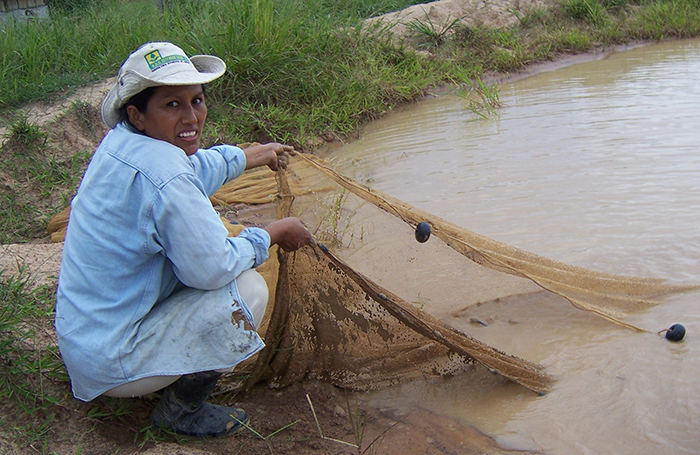“I was one of the first people to dedicate myself to fish farming. “As a woman, it is an honor to be taken into account and to be an example for other producers.”
“I consider myself an entrepreneurial woman. I'm always busy doing something. That is why I always dedicate myself to various areas. I managed to plant 400 hectares of rice here in Yapacaní and Beni, but the price fell too much that year and I went bankrupt with rice. So I had to go to Spain to work. I left for two years to be able to pay some of the credit that was owed on the agrochemicals.
When I returned from Spain, I had no activity, and one day I heard on the radio that PPVII/CEPAC were giving fish farming courses. As I had seen sardines being raised in cages in the sea, I had the idea of cage farming in the river. I had the intention of fencing a part of the Choré River that passes through my plot….but the issue of the agrochemicals they use in that area made me hesitate…. So when I heard about those fish farming courses I went to sign up.
…I was one of the first people who dedicated himself to fish farming in this municipality. ..For me it was difficult, because the first year I planted, a polar cold came and killed half of my fish that already weighed around 700 g. There was no way to heat the water and I had to net everything because my fish were going to die. Then I bought a refrigerator and filled it with my fish and froze them. I wanted to sell them but people didn't know much about this species and they made fun of me. Since they were small fish, they told me: “this is going to be pacú, it must be piranha”… and I couldn't sell. Finally, for Bolivia's anniversary, I took my fish to the plaza and grilled them... that's how I sold fish!
Whenever there were courses at PPVII/CEPAC or other places, I attended. …I attended tilapia fish farming and fish processing courses. They taught us how to make meatballs, nuggets, hamburgers, etc. I am currently training as a Technical Assistant in fish farming with the Fish for Life Project. I participated in experience exchange visits in San Ignacio de Moxos, and I participated in the creation of the new Fishing and Aquaculture Law when it was made here in Santa Cruz.
My income has improved since I grew fish on more than 12,000m2, because in fact I have been able to have capital from fish to be able to resume this agricultural activity, rice cultivation. My children's school expenses, my youngest daughter's daycare expenses, daily food expenses, all of this is paid with the profits from the fish. Practically what I earn with rice only serves to pay my machinery loan. I support the rest of my expenses with fish.”

